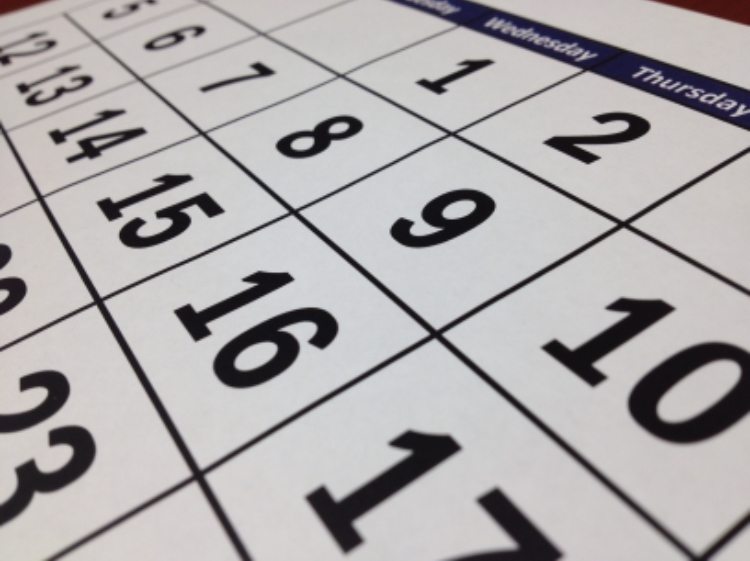Another semester has come and gone, bringing us that much closer to graduating. But in the spirit of the new year, we can all stand to let go of some habits that made the semester just a little bit harder, and pick up some habits that will hopefully make next semester a bit easier.
The first habit you may want to consider dropping is going back to your dorm or apartment between classes. No one wants to go back to a cold, bitter class after being wrapped in the sweet warmth of home. And sometimes it’s easier to be productive on campus, so rather than going home for some Netflix and a snack, get comfy with your homework at the library until your next class.
Another habit that makes our student lives harder is staying up late to do homework. Last year I said that we might as well stay up late to finish homework because we’re going to be tired no matter how much sleep we get. But the thing I didn’t realize is that not sleeping is bad for you. I know, big surprise. Sleep deprivation can mess with your heart, cause you to gain weight and can even cause hallucinations. You don’t need to be imagining your laptop is swirling in front on you as you’re trying to type your essay. So, get to bed early and be more productive when you’re awake and alert. You’ll get more done and feel better too.
If you’re easily distracted when doing homework, move every app that isn’t related to school to a different screen so that while you do homework the colorful and interesting little boxes aren’t tempting you. Also, consider turning off notifications. You don’t need to know what meme your friend tagged you in until after your work is done.
I personally get distracted when the room I’m studying in is either too quiet or too loud. I always have to have some steady, mid-volume background noise. I like to have “Friends” on TV at a low volume because I’ve seen it so many times that I don’t need to pay attention to it to know what’s happening. Having a TV show on in the background is also helpful to keeping track of time. I try to complete one assignment for each 22-minute episode.
For the forgetful and the busy, it might be good to get a planner. Keep it in your purse, on your desk or in your work space at all times. The first day of class come spring semester, after receiving all of your syllabi, write down in your planner every due date of every reading assignment, paper and test. I swear by planners. I’ve been using them ever since freshman year, and those who have taken my advice and started using planners agree that they are life savers. They keep you organized, and they make it much easier to get ahead and reduce stress.
Another method to help with forgetfulness is to simply set reminders on your phone, and set alarms to alert you when it’s time to do and finish assignments. I don’t personally do this, because when I get a notification on my phone I just brush it away and go back to scrolling on Twitter. But some people actually have self control and may benefit from this tactic.
For those who have trouble actually learning, doing homework and writing essays isn’t always enough for your brain to learn the information. But if you’re paying thousands of dollars to churn out a paper, you might as well learn while you’re at it. So, and this might sound obvious, take notes. Even if the professor doesn’t write on the board or use power points, write down what they say. Maybe even consider making flash cards from your notes. Making flash cards actually helps the learning process, and then using them acts like review, recalling the information from your memory for reinforcement. It takes some discipline, but the payoff is worth it.
For those who have a lot of books to read for, consider audio books. If you can’t afford them, you can find an audio book for any classic novel on YouTube. Also, when discussing books in class, write down the notes and comments your professor makes in the margins of your books. Then, in your notebook, write down the page numbers that your notes are on.
When we’re stressed, we often eat. And when we’re away from home for a good chunk of our day, spending money on food seems inevitable, especially when there are a dozen places on campus to get snacks. It’s incredible how much money I find myself spending on snacks every couple of days. The best way to cure yourself of this problem is to simply leave your wallet or money at home. That way, even if you’re tempted, you can’t spend any money. Your wallet and your waistline will thank you.
One of the biggest habits many of us could drop, or at least tone down, is our habit of making nihilistic jokes about school and our lives in general. Our generation likes to make jokes about how “nothing matters” and how we all just “want to die.” While this is a coping mechanism that I understand, and a hilariously relatable one, it also reinforces the idea that nothing we do matters and decreases our motivation to work towards our goals. Try to stay positive and focus on your work, even when it’s hard.
During the winter break, consider using your time off to practice some of these new habits and tips. January is usually one of the hardest months because of fewer breaks and a lack of sunlight. But hopefully at least one of these tips will help improve your start to next semester and maybe even your overall college experience.


